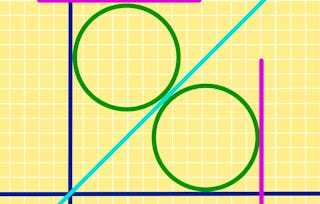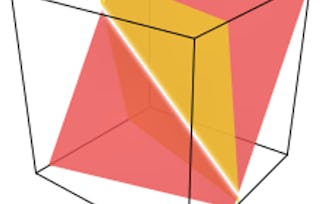This is the first course of a three course specialization that introduces the students to the concepts of linear algebra, one of the most important and basic areas of mathematics, with many real-life applications. This foundational material provides both theory and applications for topics in

Linear Algebra: Linear Systems and Matrix Equations

Linear Algebra: Linear Systems and Matrix Equations
This course is part of Linear Algebra from Elementary to Advanced Specialization

Instructor: Joseph W. Cutrone, PhD
Top Instructor
18,275 already enrolled
Included with
169 reviews
Recommended experience
Skills you'll gain
Details to know

Add to your LinkedIn profile
11 assignments
See how employees at top companies are mastering in-demand skills

Build your subject-matter expertise
- Learn new concepts from industry experts
- Gain a foundational understanding of a subject or tool
- Develop job-relevant skills with hands-on projects
- Earn a shareable career certificate

There are 4 modules in this course
In this module we introduce two fundamental objects of study: linear systems and the matrices that model them. We ask two fundamental questions about linear systems, specifically, does a solution exist and if there is a solution, is it unique. To answer these questions, a fundamental invariant needs to be found. We will use the Row Reduction Algorithm Algorithm to see the number of pivot positions in a matrix. These foundational concepts of matrices and row reduction will be revisited over and over again throughout the course so pay attention to new vocabulary, the technical skills presented, and the theory of why these algorithms are performed.
What's included
2 videos2 readings3 assignments
In this section we temporarily leave our discussion of linear systems to discuss vectors. These nx1 matrices are used in many contexts in physics, computer science and data science. We show in this section that answering questions about linear combinations turns out to be equivalent to solving a system of linear equations, underlying the deep connections of linear algebra. We then introduce the notion of a matrix as a function on vectors. Questions now about properties of the matrix as a function also turn out to be answered by solving a linear system. These connections between matrices as functions, vectors, and linear systems are sometimes why linear algebra is called the "theory of everything".
What's included
3 videos2 readings3 assignments
In this module, we study sets of vectors and functions on them. Understanding vectors and how to manipulate them via functions is quite useful in many areas, in particular, physics, computer science, math, and data science. The concept of linear dependence and linear independence is introduced along with the concept of a linear transformation. We will see when a linear transformation T can be represented by a matrix, how to find the matrix, and start to analyze the matrix to extract information about T. Pay careful attention to the new definitions in this section as they will be foundational to future modules!
What's included
3 videos3 readings4 assignments
In this cumulative assessment, we will ask about the definitions, theorems, and examples shown so far. This is an opportunity to assess your knowledge of the content. The foundational material in this course about linear systems, matrices, and vectors, is key to understanding the more advanced theory and applications of linear algebra to follow. Do the best you can on the assessment and review any questions that are incorrect and learn from them. Good luck!
What's included
1 assignment
Earn a career certificate
Add this credential to your LinkedIn profile, resume, or CV. Share it on social media and in your performance review.
Instructor

Offered by
Explore more from Machine Learning
 Status: Preview
Status: PreviewUniversitat Politècnica de València

The University of Sydney
 Status: Free Trial
Status: Free TrialJohns Hopkins University
 Status: Free Trial
Status: Free TrialJohns Hopkins University
Why people choose Coursera for their career

Felipe M.

Jennifer J.

Larry W.

Chaitanya A.
Learner reviews
- 5 stars
76.92%
- 4 stars
17.75%
- 3 stars
2.95%
- 2 stars
0%
- 1 star
2.36%
Showing 3 of 169
Reviewed on Jun 21, 2024
Very nice introduction to the subject. The instruction is clear and the quizzes are well done. Not too hard but also not easy. The lectures and notes are well reinforced by the test material.
Reviewed on Oct 2, 2024
Fun to do. As will all Coursera courses I've taken, I would have learned more if there had been a recommended text which the instructor followed.
Reviewed on May 26, 2024
It is a decent course. It provides a good additional material.

Open new doors with Coursera Plus
Unlimited access to 10,000+ world-class courses, hands-on projects, and job-ready certificate programs - all included in your subscription
Advance your career with an online degree
Earn a degree from world-class universities - 100% online
Join over 3,400 global companies that choose Coursera for Business
Upskill your employees to excel in the digital economy
Frequently asked questions
To access the course materials, assignments and to earn a Certificate, you will need to purchase the Certificate experience when you enroll in a course. You can try a Free Trial instead, or apply for Financial Aid. The course may offer 'Full Course, No Certificate' instead. This option lets you see all course materials, submit required assessments, and get a final grade. This also means that you will not be able to purchase a Certificate experience.
When you enroll in the course, you get access to all of the courses in the Specialization, and you earn a certificate when you complete the work. Your electronic Certificate will be added to your Accomplishments page - from there, you can print your Certificate or add it to your LinkedIn profile.
Yes. In select learning programs, you can apply for financial aid or a scholarship if you can’t afford the enrollment fee. If fin aid or scholarship is available for your learning program selection, you’ll find a link to apply on the description page.
More questions
Financial aid available,

